Social projects
A Touch of Africa is built on three pillars …
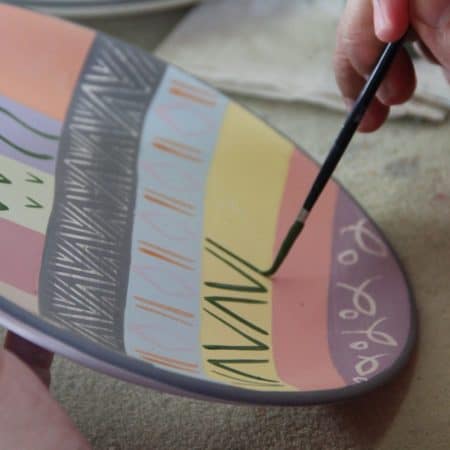
Quality
Our products are modern, beautiful (at least we think so ourselves) and of good quality. They are carefully handmade. We want you to buy them because you like them. And not out of pity. You won’t find any antique masks or “hearty” souvenirs that you can put up somewhere. Instead, you will find beautiful utility ceramics, candlesticks and jewellery. We are in the process of expanding our range.
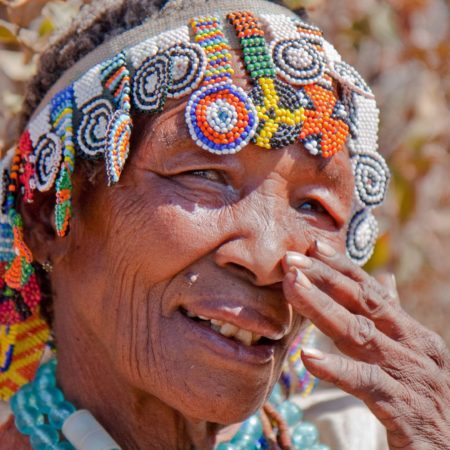
Fair trade
We attach great importance to fair trade and buy directly from the producer wherever possible. However, not all the cooperatives we buy from are certified, for example our Tuareg jewellery, which is all about mutual trust. Here too, with every product you buy, you help local artisans secure their livelihoods and send their children to school.
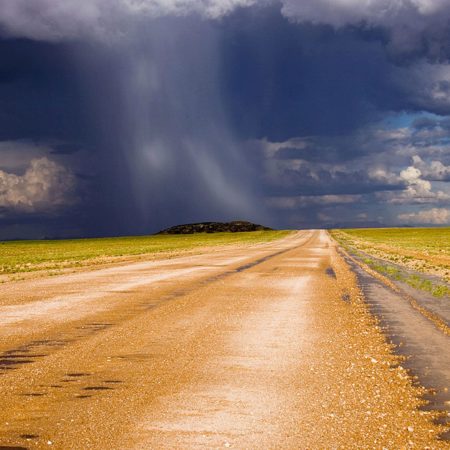
Aid projects
In many African countries there is little or no infrastructure – what exists for some wealthy people is often based on private initiative. To us, it seems especially important to ensure a minimum of health care, school attendance for children and drinking water for all. For this reason, we give you the opportunity to support small aid projects that are active in these areas.
Important facts
- How do the products get to us? In Africa, so to speak, no one can afford to produce products just like that without having a sure buyer. This means that when we need something, we send the producer our wish list, usually by email, otherwise by SMS or phone. Then we send 50% of the price so that she can buy the raw material – it’s not just lying around in her workshop/apartment. Then the production starts. Usually it takes three to four weeks. Then comes the packing and transport from the place of production to the nearest airport, then air freight to Zurich, by lorry to Bern, customs clearance and possibly inspection by the cantonal veterinarian (porcupine bristles, ostrich eggs). Then I can go and collect the products myself from the bonded warehouse. This is the fastest and cheapest way. But sometimes customs clearance already takes place in Zurich, in which case we have to pay extra for the transport Zurich-Berne. We calculate about three weeks for the transport. It takes 6-8 weeks from the time the order is placed until the goods reach us. Bulky goods come by lorry, then by ship and then by lorry again. Here, there is always the question of whether the goods are really loaded onto the ship or “forgotten”.
- Our suppliers: Many producers work at home and deliver their products to the cooperative, where they are paid and can get new material. There, of course, they can also exchange ideas with the other women producers.
Fair Trade: We follow the guidelines of the WFTO (World Fair Trade Organization). It is the international umbrella organisation for fair trade organisations in about 70 countries. It is the only global network made up of actors along the entire fair trade value chain – from production to sales.
WFTO’s goal is to improve the lives of disadvantaged producers by enhancing their market opportunities. WFTO also exerts influence at the political level to change trading conditions in the long term.
WFTO’s 10 Fair Trade Standards are:
- An opportunity for economically disadvantaged producers
- Transparency and accountability
- Fair trade practices
- Payment of a fair price
- Child labour and forced labour are excluded
- Non-discrimination, equality and freedom of association
- Better working conditions
- Promotion of skills / further training
- Promotion of Fair Trade
- Environmental protection
Aid projects
Below is a brief description of the projects supported – you can find more by clicking on the links.
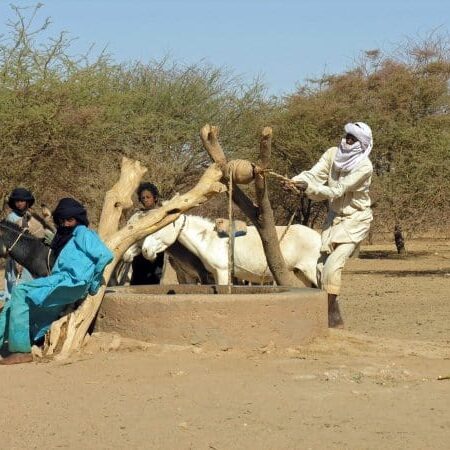
Enmigraw
The initial situation in Niger: Approximately 15 million people live in an area 30 times the size of Switzerland, 18.4% of whom are Tuareg.
- 61.4% of the population live below the poverty line
- 28% of children die before they reach the age of 5
- The current life expectancy is about 42 years
- 69% of men and 82% of women are illiterate
.
.
.
.
Existentially threatening for most of the population are regularly recurring droughts, water shortages and food shortages. In the summer half-year, temperatures are around 45 degrees during the day.
ENMIGRAW Suisse, in cooperation with Enmigraw Niger, is working for a world in which the Tuareg can take their place with dignity. The voluntary work includes the organisation, financing and coordination of aid projects for Tuareg nomads in the Sahara.
As a long-term goal, we want to support the transformation of the Tuareg into new structures, while preserving their autonomy..
Enmigraw rehabilitates and builds wells, grants micro-credits to enable business activity, including by women, and supports nomad schools to give children a better future.
More information at: www.tuareghelp.ch
![headerbild_stipendienprojekt[1]](https://www.atouchofafrica.ch/wp-content/uploads/2018/11/headerbild_stipendienprojekt1.jpg)
Soleil d’Afrique
Soleil d’Afrique, school and hospital construction in Ethiopia.
The Soleil d’Afrique Foundation was founded in 2000 by the doctor Dr Julia Bucher. In 1995, she completed an internship in the hospital of Gondar, Ethiopia, and witnessed that children were dying every day in the hospital because the necessary medical material was missing. At first, she organised medical material privately, and a few years later Soleil d’Afrique was founded in cooperation with leading doctors of the Gondar hospital.
In addition to the hospital project, Soleil d’Afrique supports a mobile eye clinic for outpatient operations for cataracts (blindness caused by clouding of the lens). In 2017, the goal of at least 1000 operations per year was achieved.
Soleil d’Afrique’s second area of impact is school education. Few young people have access to a good education. Girls in particular have to take on responsibility in their daily work and therefore do not go to school. In the public schools, there are up to 120 children in a class and the infrastructure is very modest. Soleil d’Afrique has built a school for 1120 pupils in Gondar; the responsibility for the school is now borne by the University of Gondar.
To enable children from the poorest backgrounds to attend school, Soleil d’Afrique supports 20% of the school children with a scholarship of about CHF 300 per year and child. This enables the payment of school fees, school materials, school bus, clothing and meals.
The Soleil d’Afrique Foundation Board works free of charge.
More information at: www.soleil-d-afrique.ch
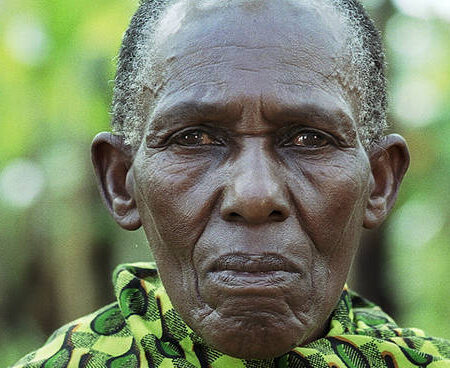
Kwa Wazee
Kwa Wazee. Support for old people in Tanzania who are raising their grandchildren.
At the turn of the millennium, every eighth child in Tanzania had only one parent or was an orphan. A total of about 2.4 million children are affected. In many cases, grandparents care for both their children with HIV and their grandchildren under precarious conditions.
Kwa Wazee was initiated in 2003 by Dr. Kurt Madörin, a Swiss development expert, and established with a small local team. At the same time, the association Kwa Wazee was founded in Switzerland for fundraising and public relations. It is networked with HelpAge Germany.
Support for the orphans requires support for the grandparents. Kwa Wazee started with both groups from the beginning. In the meantime, the spread of HIV has declined slightly and the precarious living conditions have improved somewhat.
While the affected children, with the support of Kurt Madörin, organised themselves in the sense of helping people to help themselves, discussed their strengths and listed where they most urgently needed help, the generation of grandparents was strengthened. Most of them lacked everything and it was difficult for them to feed their grandchildren from the small income they earned from farming.
The project now makes it possible in Nshamba in the Muleba district west of Lake Victoria for all old people over 70 to be guaranteed a modest old-age pension of about 7 francs per month. In addition to this old-age pension, unique in Tanzania, Kwa Wazee promotes preventive health care, self-defence (to prevent assaults on old women) and contributes to the health costs of operations. After only a few months, the pension has already had a positive effect on the health of the recipients as well as on their self-esteem and integration into society. An old-age pension for all remains Kwa Wazee’s long-term goal. Kwa Wazee Switzerland works free of charge.
More information at: www.kwawazee.ch
This Youtube film shows a payday in Nshamba:
https://www.youtube.com/watch?v=ciMQ44m8fSU
